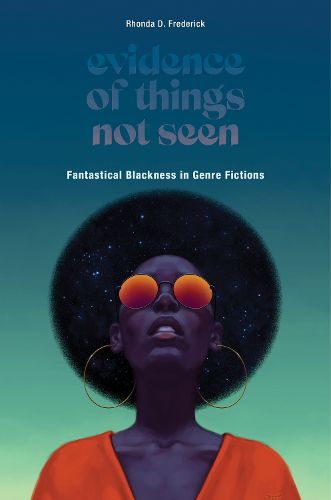Readings Newsletter
Become a Readings Member to make your shopping experience even easier.
Sign in or sign up for free!
You’re not far away from qualifying for FREE standard shipping within Australia
You’ve qualified for FREE standard shipping within Australia
The cart is loading…






Evidence of Things Not Seen: Fantastical Blackness in Genre Fictions is an interdisciplinary study of blackness in genre literature of the Americas. The fantastical in fantastical blackness is conceived by an unrestrained imagination because it lives, despite every attempt at annihilation. This blackness amazes because it refuses the limits of anti-blackness. As put to work in this project, fantastical blackness is an ethical praxis that centers black self-knowledge as a point of departure rather than as a reaction to threatening or diminishing dominant narratives. Mystery, romance, fantasy, mixed-genre, and science fictions’ unrestrained imaginings profoundly communicate this quality of blackness, specifically here through the work of Barbara Neely, Colin Whitehead, Nalo Hopkinson, and Colin Channer. When black writers center this expressive quality, they make fantastical blackness available to a broad audience that then uses its imaginable vocabularies to reshape extra-literary realities. Ultimately, popular genres’ imaginable possibilities offer strategies through which the made up can be made real.
$9.00 standard shipping within Australia
FREE standard shipping within Australia for orders over $100.00
Express & International shipping calculated at checkout
Evidence of Things Not Seen: Fantastical Blackness in Genre Fictions is an interdisciplinary study of blackness in genre literature of the Americas. The fantastical in fantastical blackness is conceived by an unrestrained imagination because it lives, despite every attempt at annihilation. This blackness amazes because it refuses the limits of anti-blackness. As put to work in this project, fantastical blackness is an ethical praxis that centers black self-knowledge as a point of departure rather than as a reaction to threatening or diminishing dominant narratives. Mystery, romance, fantasy, mixed-genre, and science fictions’ unrestrained imaginings profoundly communicate this quality of blackness, specifically here through the work of Barbara Neely, Colin Whitehead, Nalo Hopkinson, and Colin Channer. When black writers center this expressive quality, they make fantastical blackness available to a broad audience that then uses its imaginable vocabularies to reshape extra-literary realities. Ultimately, popular genres’ imaginable possibilities offer strategies through which the made up can be made real.